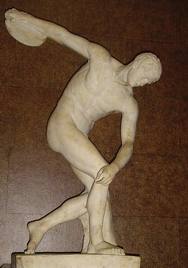The question of how m uch training is too much training is a tough one, but as Gina Kolata warns in her Personal Best column, it’s an important one, because overtraining is worse than under training. In fact, it can be worse than no training at all. Kolata quotes William Kraemer, a professor of kinesiology at the University of Connecticut, explaining that “People think a good workout is, ‘I am in a pile of sweat and puking.†Wrong. John Raglin, a sports psychologist at Indiana University tells Kolata that if you do too much with too little rest, your performance gets worse, not better. Paradoxically, the only way to get better is to train less. With heavy weights, says Kraemer, muscles need to recover after they are stressed. Rest days and easier days and weeks should be interspersed with periods when the weights are increased. Bengt Saltin, director of the Copenhagen Muscle Research Center at the University of Copenhagen, tells Kolata that endurance sports pose a different risk, depleting muscles of glycogen, their energy source, which can take up to two days to be restored. Unfortunately, says Kolata, there is no single trick for knowing when you’re overtraining. Fatigue, unsurprisingly, is one warning sign, and many people who push too hard experience depression. What to do? Pay attention to your body, pay attention to your mood. If you experience unusual fatigue or depression, take a day off. Or two. Read more from Gina Kolata. Read more on overtraining from Mark Jenkins and Sports Med Web.
uch training is too much training is a tough one, but as Gina Kolata warns in her Personal Best column, it’s an important one, because overtraining is worse than under training. In fact, it can be worse than no training at all. Kolata quotes William Kraemer, a professor of kinesiology at the University of Connecticut, explaining that “People think a good workout is, ‘I am in a pile of sweat and puking.†Wrong. John Raglin, a sports psychologist at Indiana University tells Kolata that if you do too much with too little rest, your performance gets worse, not better. Paradoxically, the only way to get better is to train less. With heavy weights, says Kraemer, muscles need to recover after they are stressed. Rest days and easier days and weeks should be interspersed with periods when the weights are increased. Bengt Saltin, director of the Copenhagen Muscle Research Center at the University of Copenhagen, tells Kolata that endurance sports pose a different risk, depleting muscles of glycogen, their energy source, which can take up to two days to be restored. Unfortunately, says Kolata, there is no single trick for knowing when you’re overtraining. Fatigue, unsurprisingly, is one warning sign, and many people who push too hard experience depression. What to do? Pay attention to your body, pay attention to your mood. If you experience unusual fatigue or depression, take a day off. Or two. Read more from Gina Kolata. Read more on overtraining from Mark Jenkins and Sports Med Web.
